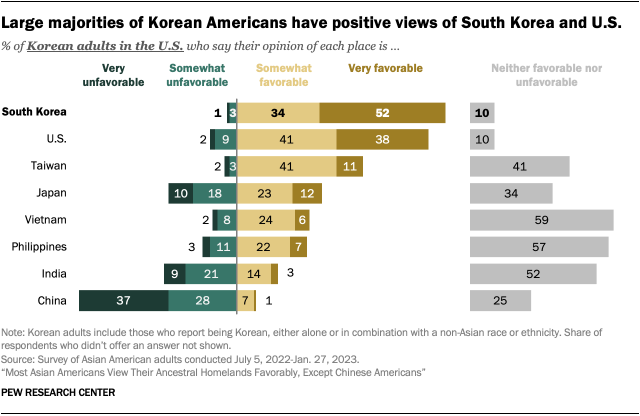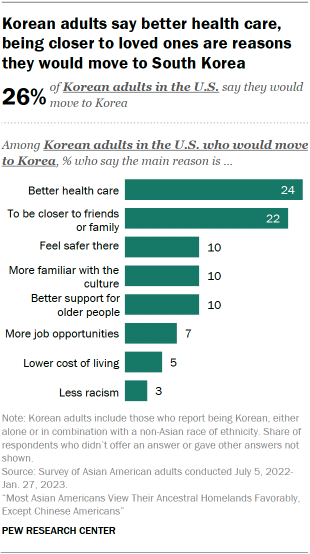A large majority (86%) of Korean adults in the U.S. have a favorable view of South Korea. They see the country most favorably of all the places asked about in our survey.
“Not long ago, I went to Korea and came back after about three and a half months. Now, Korea has developed so much that I wonder why I received (U.S.) citizenship. Still, if you want to live [comfortably] with the same amount of money, I don’t think there is anywhere comparable to the United States.”
– Immigrant man of Korean origin, age 48 (translated from Korean)
Korean men and those with a postgraduate degree stand out in their positive views. Nine-in-ten Korean adults of both groups (92%) view South Korea favorably, including 61% of men and 50% of advanced degree holders who say their opinion of South Korea is very favorable.
About three-quarters of Korean adults hold broadly positive views toward the U.S.

When asked about their views of Taiwan, Korean Americans skew positive in their opinions but are more split: They are only slightly more likely to say they have a favorable view than a neutral one (52% vs. 41%). Few Korean Americans (5%) have negative views of Taiwan.
Korean Americans are about evenly split when it comes to views of Japan. Some 36% of Korean adults have a favorable view of the country, 34% have a neutral opinion and 29% have an unfavorable view.
Korean Americans hold more neutral views of Vietnam, the Philippines and India.
About six-in-ten Korean adults say their opinions of Vietnam and the Philippines are neither favorable nor unfavorable (59% and 57% respectively). Around three-in-ten see each of these countries favorably, and around one-in-ten see each unfavorably.
While around half of Korean adults (52%) say they have a neutral opinion of India, the balance of opinion is somewhat more negative (30%) than positive (17%).
A majority of Korean adults have negative views of China. About two-thirds of Korean Americans say they have an unfavorable opinion of China.
Stronger ties to the Korean Peninsula are associated with less favorable views of Japan
Korean adults are about half as likely to hold a favorable view of Japan as other Asian adults.10 Perhaps related to the contentious historical relationship between Korea and Japan, Korean Americans’ views of Japan vary by their connection to the Korean Peninsula.
U.S.-born Korean adults are more likely to have positive views of Japan than those born abroad (50% vs. 31%). Among Korean immigrants, those who have been in the U.S. for more than two decades are more likely than those who arrived more recently to say they have a favorable view of Japan (38% vs. 20%).
Younger Korean adults are also more likely to have a favorable view of Japan than older Korean adults: Four-in-ten Korean adults in the U.S. ages 18 to 49 say their opinion of Japan is very or somewhat favorable, compared with about a quarter of those 50 and older.
Most Korean adults say they would not move to Korea

Though an overwhelming majority of Korean adults in the U.S. have a favorable view of South Korea, only about a quarter (26%) say they would ever move there. Roughly three-quarters of Korean adults (72%) say they would not move to Korea.
Views do not differ between those who are foreign born and those who were born in the U.S.
Among the one-in-four Korean adults who say they would move to Korea, about half said the main reason would be to receive better health care (24%) or to be closer to friends or family (22%).
Smaller shares of Korean adults who said they would move to South Korea said the main reason is because they feel safer there, they’re more familiar with Korean culture, or because South Korea has better support for older people (10% each).
“It has been more than a decade since I first came to the United States, and in the meantime South Korea has developed a lot. Electronic devices that used to be dominated by Japanese products have now been replaced with Korean products, making me proud to be a Korean. There are many Korean cars, and K-pop and Korean food – all have grown a lot.… Talking about Korea’s rapid growth made me feel proud as a Korean.”
– Immigrant woman of Korean origin, age 41 (translated from Korean)




